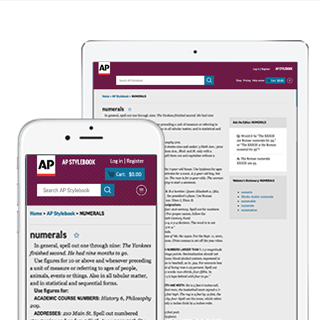Ask the Editor
Last Seven DaysQuestion from Kansas City, Missouri, on May 1, 2024
Answer
-maker, -making No hyphen in commonly used words such as automaker, automaking; dealmaker, dealmaking; drugmaker (but drug-making); filmmaker, filmmaking; moneymaker, moneymaking; policymaker, policymaking; speechmaker, speechmaking. An exception: decision-maker, decision-making. Also: coffee maker. Avoid contrived combinations such as difference-maker and magic-maker. But if using less common terms such as those, include the hyphen. No hyphen with proper nouns, such as iPhone maker.
Question from Indianapolis, Indiana, on May 1, 2024
Answer
Question from Loma Linda, California, on May 1, 2024
Answer
Question from Detroit, Michigan, on May 1, 2024
Answer
Question from Atlanta, Georgia, on April 30, 2024
Answer
events
Question from Charlotte, North Carolina, on April 30, 2024
Answer
Question from Charlotte, North Carolina, on April 30, 2024
Answer
Question on April 29, 2024
Answer
Also, we wouldn't use the long title before the name. Instead:
“We are thrilled to open our first location with Brame Brands,” Jake Berchtold, president and COO of FAT Brands' Fast Casual Division, said in a press release.
For that matter, we would paraphrase rather than use the direct quote, which is not a compelling quote. But that's a different issue.
Question from San Miguel, California, on April 29, 2024
Answer
We make that clarification in the revised introduction to the numerals entry. The guidance itself hasn't changed, but we tried to explain it more clearly.
In general, spell out one through nine: He had nine months to go. She has eight bicycles. The Yankees finished second.
- For ages (of people, animals, events or things)
- When preceding a unit of measure (inches, pounds, miles, quarts, temperature degrees, etc.) — except for time measurements
- In other cases listed below
(And the entry continues from there.)
Question from Goshen, Indiana, on April 29, 2024
For example, which is correct? "Please fill out the 'Your Money, Your Way' worksheet." or "Please fill out the 'your money, your way' worksheet." or "Please fill out the your money, your way worksheet."
Answer
Question from Wilmington, Delaware, on April 29, 2024
Answer
Yes, we spell out numbers under 10 in general. But there are lots of exceptions.
We also generally spell out ordinals (such as fourth) but there are exceptions to that, as well. Dates aren't listed as an exception because we typically don't write May 4th (instead, just May 4.) See below for that section of the numerals entry.
I think I'd go with May the 4th be with you. That's in keeping with our general guidance on dates. It's also how the Star Wars folks style it themselves.
Ordinals
Question from Chicago, Illinois, on April 29, 2024
Answer
Question from Washington, District of Columbia, on April 29, 2024
Basically, hyphen or no hyphen?
Answer
Question from Everett, Washington, on April 27, 2024
Answer
Thank you!
Question from Cassopolis, Michigan, on April 26, 2024
Answer
Answer
Question from San Francisco, California, on April 26, 2024
Answer
SUBSCRIBE TO AP STYLEBOOK ONLINE
Comprehensive AP style guidance on your computer, tablet and phone
 This searchable, customizable, regularly updated version of AP Stylebook offers bonus features including Ask the Editor and Topical Guides. Add Webster's New World College Dictionary for a more comprehensive resource.
This searchable, customizable, regularly updated version of AP Stylebook offers bonus features including Ask the Editor and Topical Guides. Add Webster's New World College Dictionary for a more comprehensive resource.
Your subscription includes the popular Ask the Editor feature, where you can ask your own questions and search thousands of past answers, and Topical Guides, offering guidance to help you write about events in the news.
Sign Up for our Newsletter
Keep up to date on style news. Sign up for our stylish monthly e-newsletter by submitting your email address below.
Request your free 14-day trial
Try AP Stylebook Online for yourself
We offer free trials of individual subscriptions and 10-user site licenses for AP Stylebook Online.
We will include access to Webster's New World College Dictionary, the official dictionary of the AP Stylebook.
At the end of your free trial, we will ask you if you would like to continue your service so you can keep any of the custom entries you created on Stylebook Online.